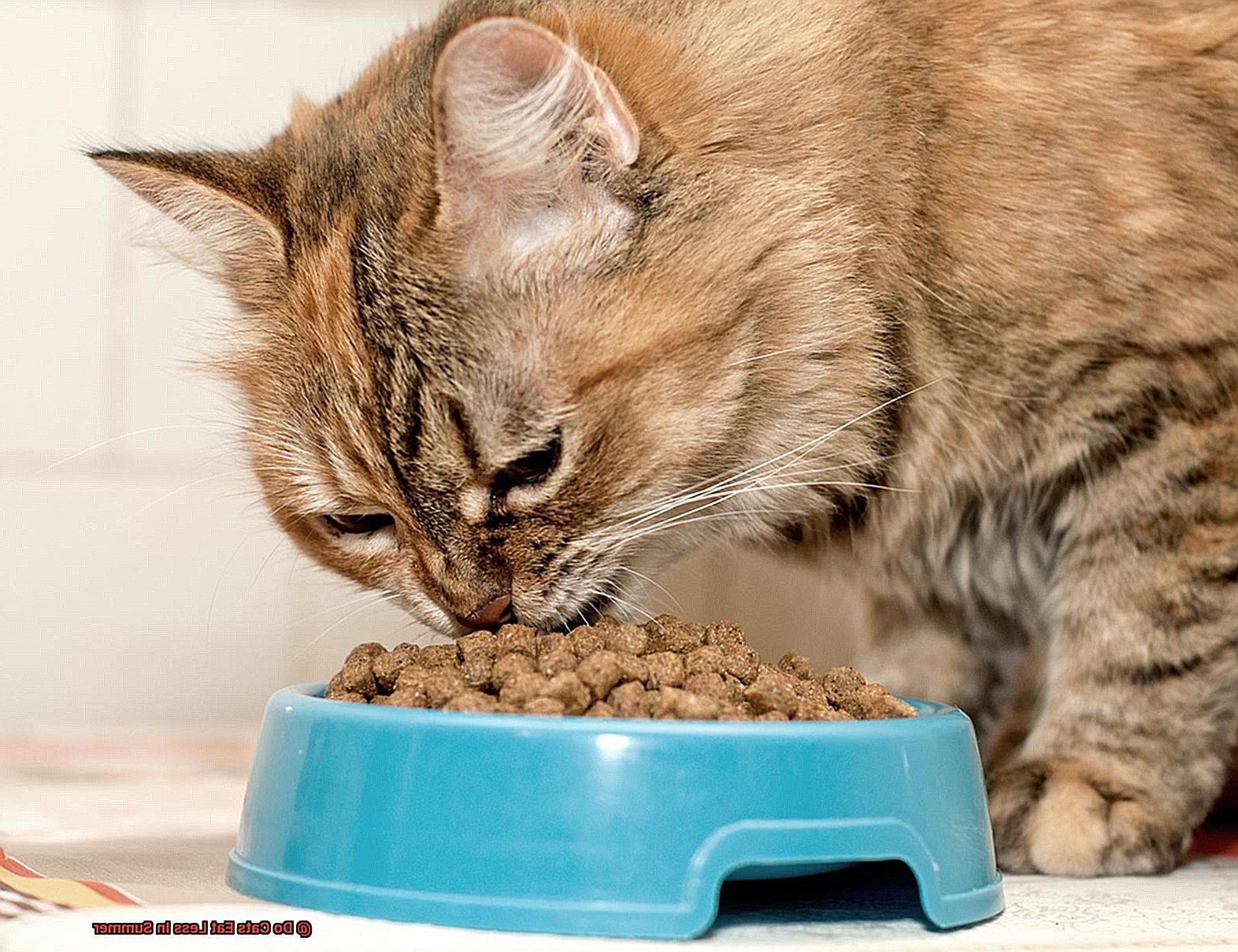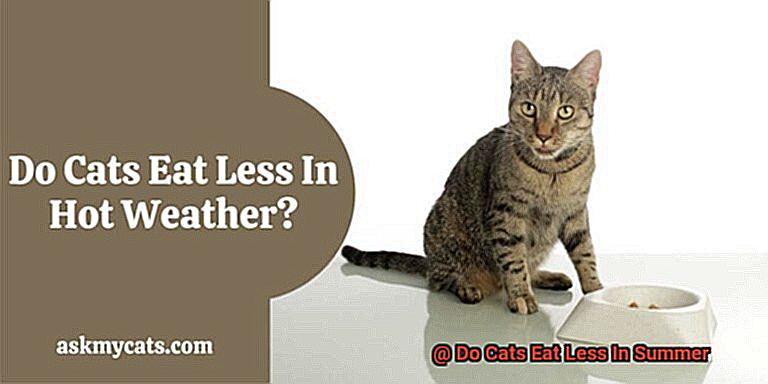Do cats eat less in the summer? It’s a question many cat owners ponder during the hot months. The answer may surprise you.
Cats don’t need to eat as much when temperatures rise, but there are still important things to consider when it comes to their diet. In this blog post, we’ll explore why cats will eat less in the summer, what types of food they should be eating, and how to make sure your cat is getting all their nutritional requirements.
So if you want to keep your feline friend healthy during the warmest season of the year, then read on!
What Do Cats Eat In Summer?
Cats require a well-balanced diet all year, but it is especially important to ensure that they receive adequate nutrition during the summer months.With the warm weather comes a preference for wet food, and protein should be at the forefront of their diet. Cats also need access to plenty of water and a variety of nutritious foods to stay healthy.
When it comes to feeding cats in the summer, variety is key. Owners should provide wet and dry food, treats, and even raw or freeze-dried food, as these can be easier for cats to digest in hot weather. But remember not to overfeed your cat—portion sizes should always be monitored closely.
Do Cats Eat Less In Summer?
The summer months can be a tricky time for cats when it comes to their diet.
While some cats may eat less in the summer, others may not change their eating habits at all.
This can depend on a variety of factors, such as the breed of cat, the environment they live in, and the type of food they are fed.
For cats living in hot climates, eating less in the summer is common. This is because cats are sensitive to heat and may not feel as hungry when it’s hot outside.
In addition, cats may not be able to digest food as well in the summer due to the higher temperatures. As a result, cats may eat less during this time of year.
On the other hand, cats living in cooler climates may not experience much of a change in their eating habits during the summer months.
They may still eat as much as they normally do and not be affected by the heat. It’s important to monitor your cat’s eating habits, no matter what climate they live in, as any sudden changes could be a sign of health issues.
Overall, whether cats eat less in the summer depends on a variety of factors. If your cat lives in a hot climate, it may eat less due to the heat. However, if they live in a cooler climate, they may not experience any changes in their eating habits. It’s important to keep an eye on your cat’s diet and consult with your veterinarian if you notice any sudden changes.
Reasons Why Cats Eat Less In Summer
As the summer months roll in, cats may find themselves eating less than usual. While this can be concerning for owners, there are several possible explanations for why cats eat less in the summer.

The temperature of the summer can cause cats to be less active and expend fewer calories, leading to them eating less food. Cats may also be drinking more water due to the heat, which can fill them up and reduce their appetite.
Cats may also be spending more time in the sun during these months, making them lethargic and disinterested in eating. Finally, an increased number of insects around during the summer months could mean that cats are trying to catch and eat these instead of their regular diet.
It’s important to keep an eye on your cat’s diet during the summer months to make sure they stay healthy and happy.
If you notice your cat is eating less than usual or not getting enough nutrition, it might be time to talk to your vet about potential solutions.
Temperature Effects On Cat Appetite
Temperature can have a huge impact on a cat’s appetite. When the weather is hot, cats may become lethargic and less active, leading to decreased food intake.
High temperatures can also cause cats to lose their appetite due to dehydration or heat exhaustion.
Conversely, in cold weather, cats may eat more to keep their bodies warm and maintain energy levels.
Cat owners need to monitor their pet’s activity and appetite in both hot and cold seasons. If your cat isn’t eating enough due to extreme temperatures, you may need to change the environment or find additional food sources.
You should also make sure your cat has access to plenty of fresh water at all times.
Dietary Changes For Cats In Summer
It’s summertime, and cats need special attention to stay cool and hydrated. Here are some dietary changes you can make to ensure your feline friend is happy and healthy during the hottest season of the year.

First, offer your cat plenty of water. Cats may need more than usual in the summer due to an increased risk of dehydrationdue to an increased risk of dehydration. You can also add wet food or treats to their diet for an extra boost of moisture.
Second, switch up their food. High-fiber foods, like canned wet food, will help cats stay cool and hydrated. Protein-rich foods such as dry kibble will give them energy, while smaller meals throughout the day can help them keep their cool in the heat of the day.
What to Look for If Your Cat Is Eating Less
It’s important to be aware of the signs that could indicate a problem. Here are six warning signs to look out for:
Weight loss
If your cat is not getting enough nutrition, you may notice weight loss. To monitor this, weigh your cat regularly and observe any changes in its body shape.
Lethargy
Cats that are not eating enough may become lethargic and sleep more than usual. They may also show disinterest in playing or being active.
Lack of appetite
A lack of appetite when offered food is another sign of insufficient nutrition. Your cat may turn away from food or take small bites and then leave it uneaten.
Behavior changes
Cats that are not getting enough calories may display changes in behavior such as aggression, irritability, or depression.
Vomiting
If a cat is not getting enough nutrition, it may vomit after eating due to an inability to digest the food properly.
If you notice any of these symptoms in your cat, it’s important to contact your veterinarian for advice on the correct course of action.
Tips for Increasing Appetite in Hot Weather
In hot weather, cats may not feel as hungry as they do in cooler months. To ensure that your cat is getting the nutrition it needs, here are seven tips to help stimulate its appetite.
Smaller Meals
To help stimulate a cat’s appetite in hot weather, feed them smaller meals more often throughout the day. This will also help keep their energy levels up and prevent them from becoming overwhelmed by large meals.
Provide Cool Water
Make sure to provide your cat with plenty of cool, fresh water during the summer months. This will help keep them hydrated and their appetite stimulated.
Wet Food
Offering wet food is a great way to help stimulate a cat’s appetite in hot weather, as it is easier for them to digest and provides more moisture than dry food.
Flavor Boosters
Try adding some flavor boosters, such as tuna juice or chicken broth, to your cat’s food to make it more appealing and enticing for them to eat.
Supplements
If your cat is still not eating enough, consider giving them supplements such as probiotics or digestive enzymes to help stimulate their appetite and digestion.
Playtime
Increasing playtime can help stimulate your cats’ appetites by providing them with physical activity and mental stimulation which will make them hungrier!
Cool Environment
Make sure the room temperature is comfortable and not too hot for your cat by providing fans or air conditioning if necessary so that they don’t become overheated or uncomfortable while eating their meals.
When Should You Seek Veterinary Help?
It’s essential to pay attention to your cat’s appetite and food intake. If your feline friend isn’t eating enough to maintain a healthy body weight, it may be time to seek veterinary advice. This could be due to illness, disease, or stress. Be sure to note any changes in behavior or demeanor that may indicate an issue.
If your cat hasn’t eaten for more than 24 hours, it’s important to get professional help right away.
A vet can check for any underlying medical conditions and provide advice on how to help the cat regain its appetite.
In some cases, dietary changes or supplements may be recommended.
Keep track of your kitty’s feeding habits and watch out for signs of decreased appetite. If you notice a change in the amount of food they are consuming, don’t hesitate to seek out professional assistance.
Also Read: Should I Shave My Cat In Summer?
Conclusion
In conclusion, cats need extra attention during the summer months to remain healthy and content.
Their appetite may decrease in hot weather, but it’s still essential to provide a balanced diet of wet and dry food, snacks, raw or freeze-dried food, and plenty of water.
Look out for signs that could indicate a problem, such as weight loss, lethargy, a lack of appetite, changes in behavior, or vomiting.
To encourage eating, serve smaller meals more often throughout the day, add flavor enhancers to meals, and consider supplements if necessary.
If your cat isn’t eating enough, seek veterinary assistance immediately, as it could be related to an illness or disease.







